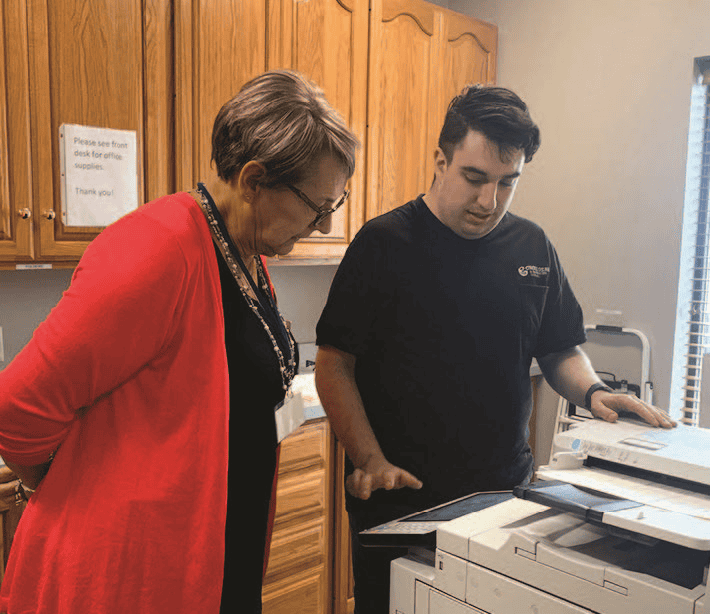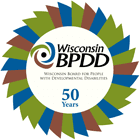Self-Advocate Leadership
and Engagement:
Agencies
Why Self-Advocate Leadership and Engagement is Important to Agencies
Studies about participating in self-advocacy opportunities show significant, positive impacts on the well-being of people with I/DD, including, but not limited to:
• Improved social networks
• More engagement in meaningful activities
• Improved self-esteem and confidence
• Better mental physical and mental health
• Acquisition of new skills
• Improved resilience
The Home and Community Based Services (HCBS) Settings Rule requires agencies to actively inform and support people they serve to exercise their basic human rights. Agencies lacking effective models and tools for rights promotion are at risk of defaulting to compliance-driven approaches that merely inform people of their rights in member service manuals provided at intake or at annual meetings. HCBS organizations can – and should – do more to improve people’s quality of life through regular engagement in a variety of self-advocacy
opportunities.
Living Well created tools and tested approaches agencies can use to support people to learn about their rights, gain self-advocacy skills, and take on leadership roles. The approaches Living Well agencies used had a bigger impact when people with lived experience were involved in co-facilitating and leading opportunities. The most effective approaches focused on two key areas:
1) Offering a variety of opportunities for people to learn, self-reflect and plan and 2) Supporting people who receive services to co-design and lead opportunities. By providing a range of opportunities, agencies observed people, some of whom they had supported for years, grow in ways they had not considered before.
People with disabilities are 27 times more likely to exercise their rights
when organizations have supports in place to assess, educate, and support them to exercise their rights. This statistic is significant. Rights promotion should be
a top priority for HCBS organizations.
How Agencies Can Foster Self-Advocate Leadership and Engagement
Agencies can engage people in one-to-one and small group opportunities that help them discover more about themselves, make connections with others, learn how to stay safe, and speak up for themselves. New assessment and planning tools will provide new ways for staff to have meaningful conversations
and teach information that improves people’s health, safety and overall well-being. Agencies should use tools that are designed in plain language and reviewed by self-advocates.
Conduct better assessments to learn more about the people and what is important to them.
- Use the Life Skills Self-Assessments, Quality of Life Questionnaire, and/or Personal Outcome Measures Interviews to engage people in deeper, more meaningful conversations about their life experiences, preferences, and
support needs. - Use the Healthy, Safe and Connected Toolkit to identify health support needs, raise awareness about abuse and how to report it, and encourage people to get more involved in their communities.
Provide training and education on self-advocacy and human rights.
- Facilitate Safe and Free meetings with self-advocate leaders to introduce Self-Advocacy concepts and learn what people are interested in knowing more about.
- Host peer group meetings on topics of interest such as voting, healthy relationships, employment, and safety.
- Use the Let’s Talk About Rights Guides and videos to educate and elevate the importance of rights, identify ways people’s rights have been limited, and stir up conversations about personal advocacy.
- Train staff to understand the content of Safe and Free and Let’s Talk About Rights in order to use these materials and weave the topics into discussions while providing one-to-one or small group services.
- Use Open Future Learning training modules to improve your staff’s understanding of person-centered thinking and
planning.
Create opportunities for empowerment and leadership.
- Identify and support self-advocate leaders to learn the content of Safe and Free and Let’s Talk About Rights to engage their peers in conversations about these important topics.
- Support self-advocates to reflect on and find power in their self-advocacy journey through writing/recording and sharing their personal stories.
- Support a People First Chapter for self-advocates to make connections and take action in their communities.
- Establish an Advisory Committee comprised of people who receive services and their family members to co-design and improve service delivery.
- Find opportunities for people to mentor one another.
Tools for Agencies
Safe and Free Meeting Guides – Safe and Free meetings are designed to help youth and adults with I/DD learn about important topics and skills for self-advocacy, safety and independent living. This meeting series is co-facilitated by a self-advocate leader and an agency staff. Meetings are typically 1 hour to 1.5 hours long. There are 12 meetings in the series. The topics include: Knowing
Yourself, Knowing Your Community, Communication, Problem Solving, Rights, Voting, Safety at Home, Safety in the Community, Abuse Awareness and Relationships.
Let’s Talk About Rights Guides and Videos – These guides and videos help people understand human rights. There are three guides available: one for self-advocates, one for agency staff and one for family members and guardians. Each guide was developed in workbook format to facilitate reflection and
planning.
Healthy Safe and Connected Toolkit – The toolkit features three sections: Stay Healthy, Stay Safe, and Stay Connected. These sections feature plain language resources and worksheets for you to fill out and talk about with your supporters.
The fillable version of the toolkit can be downloaded in English, Spanish, or Hmong here. You can also fill out our resource order form to get physical copies mailed to you for FREE!
Personal Outcome Measures Interviews – Developed by The Council on Quality and Leadership, The Personal Outcome Measures® (POM) is a person-centered discovery tool to explore the presence, importance, and achievement of
personally-defined outcomes, along with the supports that help people attain their individual goals and dreams.
TransCen Skills Assessment – TransCen, Inc.’s Life Skills Assessment is a simple, one-page survey that measures an individual’s ability to function safely and effectively in our world. The tool uses a 5-point rating scale to evaluate an
individual’s level of independence and support needs across a number of life domains (i.e., home, community, social competencies).
Quality of Life Questionnaire – The World Health Organization Quality of Life Questionnaire provides a format to assess people’s experiences and satisfaction with their physical health, psychological well-being, social relationships and living
environments.
People First Chapters– People First Wisconsin is a statewide self-advocacy organization for people with disabilities. By joining together in groups, individuals with disabilities learn to speak up for themselves, share ideas, friendships and
information. Agencies can provide support to a group of self-advocates to start/maintain a local People First Chapter.
Open Future Learning – Open Future Learning is a training resource that will change the way you think about your work and the way that you support people with Intellectual and Developmental Disabilities. Open Future Learning uses the
power of stories and content from leaders in the IDD community to create affordable, on-demand training for agencies.
Reflection Activity
Download the Reflection Activity to make your Self-Advocate Leadership and Engagement Action Plan!

Navigate the Blueprint
“I have been able to help people understand
the rights that are taken away from us because people think we can’t make choices for ourselves. We are teaching the self-advocacy toolkit and I have seen the people blossom.” -Self-Advocate Leader
Real Lives. Real Connections.
“We work with a young man and his life was considerably changed through the work we did through Living Well. He started just really diving into what self-advocacy means in his life. He worked on the rights toolkits for us. He stepped up and facilitated a breakout room for our People First community conversation. He went to Madison, met his legislatures for the first time ever, first time ever being at the Capitol and in Madison for Advocacy Day.”
– Living Well Pilot Site

